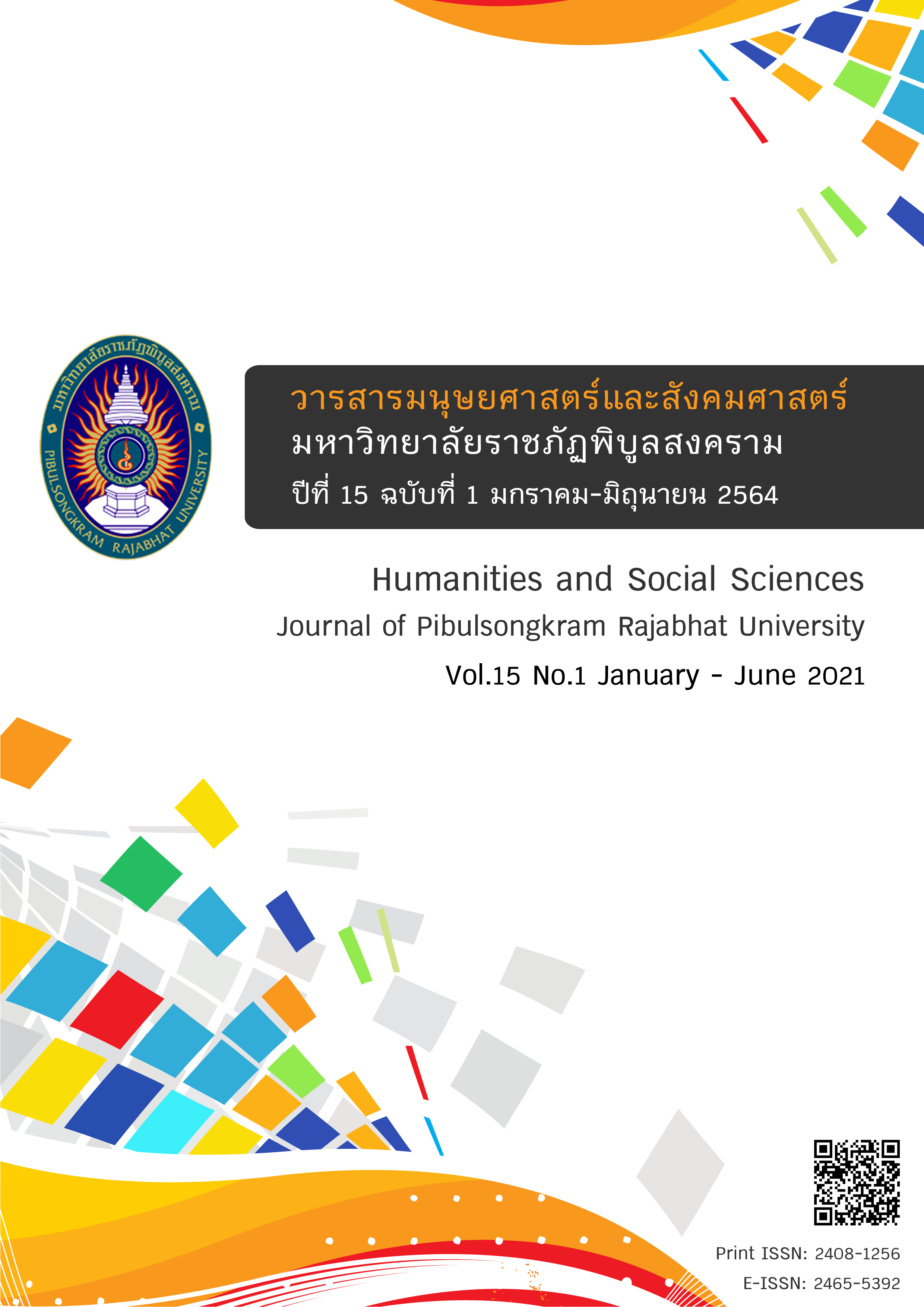Service Marketing Mix Affecting Customer Loyalty in Hotel Business of Tourists in Muang, Phitsanulok
DOI:
https://doi.org/10.14456//psruhss.2021.12Keywords:
Service Marketing Mix, Customer LoyaltyAbstract
The objectives of this research were 1) to study tourists’ personal factors and hotel business’s service marketing mix (7P’s) and customer loyalty in using the service of hotels in Mueang District, Phitsanulok Province, and 2) to compare customer loyalty in the hotel business in Mueang District, Phitsanulok Province, classified by personal factors, and 3) to study the service marketing mix affecting customer loyalty in the hotel business in Mueang District, Phitsanulok Province. A questionnaire was used as a research instrument to collect data from the sample of 385 tourists visiting Mueang District, Phitsanulok Province. Data were analyzed using statistics including percentage, mean, standard deviation, t-test, F-test and Multiple Regression Analysis The results of analyzing descriptive data showed that most of the sample was female, 31-40 years old, married person, graduated with a bachelor’s degree level, business owner, and earned annual income of 40,001-50,000 baht. The results of analyzing service marketing mix (7P’s) found that place, personnel, and process were at the highest level. In terms of customer loyalty, regular service and customer loyalty over the long term, and greater opportunity to use hotel service were at the highest level. 1) The results of analyzing inferential data showed that the sample with different occupation and income had different customer loyalty with a statistical significance level of 0.05, and 2) promotion, place, people, process, and product influenced customer loyalty with a statistical significance level of 0.05. All factors could jointly explain the 29.10% of the variation in customer loyalty and the remaining 70.90% of the variation was explained by other factors.
References
คมชัดลึก. (2553). ธุรกิจ รร. เมืองสองแควแข่งเดือดแห่ลงทุนเปิดตลาดบน กรุงเทพฯ. สืบค้น 20 กันยายน 2562, จาก https://www.komchadluek.net/news/economic/63272
จงรัก เตปิน. (2550). ปัจจัยการตลาดที่มีผลต่อการตัดสินใจเลือกใช้บริการโรงแรมของลูกค้าคนไทยในเขตเมืองพัทยา (วิทยานิพนธ์บริหารธุรกิจมหาบัณฑิต). มหาวิทยาลัยสุโขทัยธรรมาธิราช, นนทบุรี.
ชัยวัฒน์ ชัยสิริพร. (2557) ความพึงพอใจของนักท่องเที่ยวชาวไทยที่มีต่อโรงแรมขนาด 3 ดาว ในเขตกรุงเทพมหานคร (การค้นคว้าอิสระศิลปศาสตรมหาบัณฑิต). มหาวิทยาลัยกรุงเทพ, กรุงเทพฯ.
ณัฐนนท์ โชครัศมีศิริ. (2558). ปัจจัยส่วนประสมทางการตลาดที่มีความสัมพันธ์ต่อความจงรักภักดีของผู้บริโภค ในการเลือกใช้บริการโรงแรมราคาประหยัดในอําเภอเมือง จังหวัดนครปฐม. นครปฐม: มหาวิทยาลัยศิลปากร.
ธรรมจักร เล็กบรรจง. (2558). ปัจจัยส่วนประสมทางการตลาด 7Ps ที่มีผลต่อการตัดสินใจ เลือกใช้บริการโรงแรมฮาลาลของนักท่องเที่ยวมุสลิมชาวไทยในจังหวัดภูเก็ต (วิทยานิพนธ์วิทยาศาสตมหาบัณฑิต). จุฬาลงกรณ์มหาวิทยาลัย, กรุงเทพฯ.
นาตยา เจริญผล. (2555). ปัจจัยที่มีอิทธิพลต่อการตัดสินใจเลือกใช้บริการที่พักของนักท่องเที่ยวต่างชาติในอำเภอเกาะสมุย จังหวัดสุราษฏร์ธานี เปรียบเทียบระหว่างนักท่องเที่ยวชาวยุโรปและชาวเอเชีย (การค้นคว้าอิสระบริหารธุรกิจมหาบัณฑิต). มหาวิทยาลัยเทคโนโลยีราชมงคลธัญบุรี, ปทุมธานี.
ประชาชาติธุรกิจ. (2561). “55 เมืองรอง” เติบโตทุกมิติ ททท. เร่งสร้างแบรนด์กระตุ้นรายจังหวัด.
สืบค้น 16 สิงหาคม 2561, จาก https://www.prachachat.net/tourism/news-205390.
พิศิษฐ ตัณฑวณิช และพนา จินดาศรี. (2561). ความหมายที่แท้จริงของค่า IOC. วารสารการวัดผลการศึกษา มหาวิทยาลัยมหาสารคาม, 24(2), 3-12.
พุทธชาด ลุนคำ. (2562). แนวโน้มธุรกิจ / อุตสาหกรรม ปี 2562-2564 : ธุรกิจโรงแรม ธนาคารกรุงศรีอยุธยา. สืนค้น 22 กันยายน 2562, จาก https://bit.ly/2I32Jbx
ศิริชัย กาญจนวาสี. (2544). การเลือกใช้สถิติที่เหมาะสมสำหรับการวิจัย (พิมพ์ครั้งที่ 4). กรุงเทพฯ: บุญศิริการพิมพ์.
ส่วนการรักษาความสงบเรียบร้อย 3. (2561). จำนวนโรงแรม/ข้อมูลโรงแรม. กรุงเทพฯ: กรมการปกครอง.
สำนักงานการท่องเที่ยวและกีฬาจังหวัดพิษณุโลก. (2562). จำนวนนักท่องเที่ยว/รายได้จากการท่องเที่ยว. พิษณุโลก: สำนักงานการท่องเที่ยวและกีฬาจังหวัดพิษณุโลก.
กระทรวงการท่องเที่ยวและกีฬา. (2562). รายงานฉบับสมบูรณ์แผนยุทธศาสตร์ส่งเสริมการท่องเที่ยวเชิงคุณภาพ พ.ศ. 2558-2562. กรุงเทพฯ: สำนักงานปลัดกระทรวงการท่องเที่ยวและกีฬา.
Akbar, M. M., & Parvez, N. (2009). Impact of service quality, trust, and Customer Satisfaction on Customer loyalty. A. BAC Journal, 29(1), 24-38.
Chiu, C-H., Chenhg, H-L., Huang, H-Y., & Chen, C-F. (2013). Exploring individuals’ subjective well-being and loyalty towards social network sites from the perspective of network externalities: The Facebook use. International Journal of International Management, 33, 539-552.
Cochran, W. G. (1953). Sampling Techiques. New York : John Wiley & Sons.
Cyr, D., Head, M., & Ivanov, A. (2009). Perceived interactivity Leading to e-loyalty : Development of model cognitive – affective user responses. International Journal of Human – Computer Studies, (67), 850 – 869.
Kotler, P. (1997). Marketing Management: Analysis, Planning, Implementation and Control
(14th ed.). Upper Saddle River, NJ: Prentice-Hall.
Kotler, P. (2000). Marketing Management, Millenium Edition (10th ed.). Boston: Pearson Custom Publishing.
Shoemaker, S., & Lewis, R. C. (1999). Customer loyalty: The future of hospitality marketing. International Journal of Hospitality Management, 18(4), 345-370.
Downloads
Published
How to Cite
Issue
Section
License
Any articles or comments appearing in the Journal of Humanities and Social Sciences, Rajabhat Phibulsongkram University, are the intellectual property of the authors, and do not necessarily reflect the views of the editorial board. Published articles are copyrighted by the Journal of Humanities and Social Sciences, Rajabhat Phibulsongkram University.









